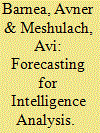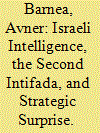| Srl | Item |
| 1 |
ID:
179142


|
|
|
|
|
| Summary/Abstract |
A successful strategic surprise, whether in the military or business sector, can have critical significance both for the initiating organization (the “attacker”) and the organization under attack (“the victim”). In the military sector, the attack can disrupt the victim’s strategic organization, inflict untold damage, foil its ability to protect itself and to react, and even determine the outcome of the battle. For example, the sudden strike that the Germans unleashed on the USSR in Operation Barbarossa (1941) disrupted the USSR’s defense systems, dealt the Russian soldiers a fatal blow, and greatly expedited Germany’s huge land invasion of the USSR. It took the USSR two to three years to recover and rebuild to the level where it could challenge the German powerhouse. The attack on Pearl Harbor in 1941 had the same destructive effect on U.S. forces in a single day.
|
|
|
|
|
|
|
|
|
|
|
|
|
|
|
|
| 2 |
ID:
191885


|
|
|
|
|
| Summary/Abstract |
The challenge of this article is on deciding the two-decade-old controversy among Israeli intelligence scholars and practitioners over what caused the outbreak of the Palestinian uprising in October 2000. The question remains: Was it preplanned by the Palestinian Authority or a spontaneous response to the violence that ensued following the visit to the Temple Mount by Israeli opposition leader Sharon, which was seriously escalated by Israel’s excessive military response? Drawing on a theoretical framework of two types of strategic surprises, the article clarifies the controversy and explains the outbreak of what became a long and bloody Israeli–Palestinian confrontation.
|
|
|
|
|
|
|
|
|
|
|
|
|
|
|
|
| 3 |
ID:
114691


|
|
|
|
|
| Publication |
2012.
|
| Summary/Abstract |
The goal of this article is to challenge the assumption of rationality in the behavior of decision-making units involved in security, defense, intelligence and warfare and to consider the influence of "motivated bias" in such instances. A review of motivational literature within international politics and a discussion of literature applying "motivated biases" to warfare and strategic surprise will offer an alternative view of the primacy of rationality in such decisions.
|
|
|
|
|
|
|
|
|
|
|
|
|
|
|
|
| 4 |
ID:
190853


|
|
|
|
|
| Summary/Abstract |
The study of why and when governments are caught out by strategic surprise has been a major occupation of intelligence studies, international relations, public administration and crisis management studies. Still little is known, however, about the structural vulnerabilities to such surprises in international organisations such as the European Union (EU). EU institutions themselves have not undertaken rigorous investigations or public inquiries of recent strategic surprises, instead relying on internal review processes. In order to understand the most common underlying problems causing surprise in the EU context, this paper adapts and tests insights from the strategic surprise literature. It elaborates a theoretical framework with five hypotheses about why the leadership of EU institutions has been prone to being caught by surprises in foreign affairs: limitations in collection capacity, institutional fragmentation of policymaking, organisational culture, member state politicisation, and cognitive biases arising from collective ideas and norms. These hypotheses are tested using a post-mortem approach investigating two significant strategic surprises: the start and spread of the Arab uprisings of 2010/11 and Ukraine–Russia crisis of 2013/14.
|
|
|
|
|
|
|
|
|
|
|
|
|
|
|
|
| 5 |
ID:
124604


|
|
|
|
|
| Publication |
2013.
|
| Summary/Abstract |
This article purports to examine the role of the United States in the outbreak of the Arab Spring and the course of its subsequent paths. The main argument of this article is that the Arab Spring represented a major strategic surprise to the United States. It did not plan or facilitate the Arab Spring as the Tunisian, Egyptian, Yemeni and Bahraini regimes were performing to the best satisfaction of American interests in the Arab world. As the Arab Spring carried with it threats to American regional interests, the United States moved to secure its interests by steering Arab uprisings towards courses of action which best suit these interests.
|
|
|
|
|
|
|
|
|
|
|
|
|
|
|
|